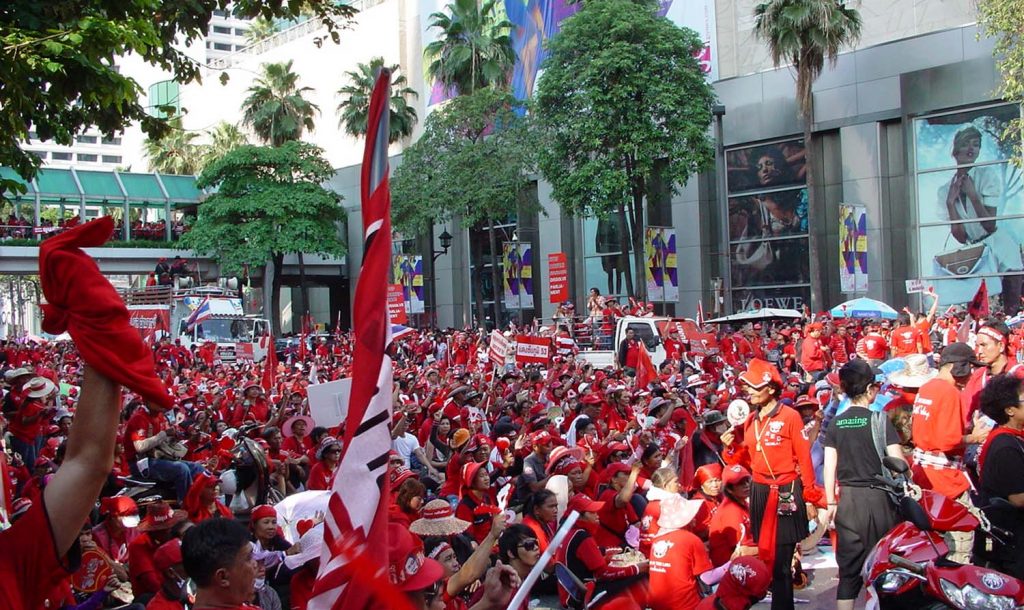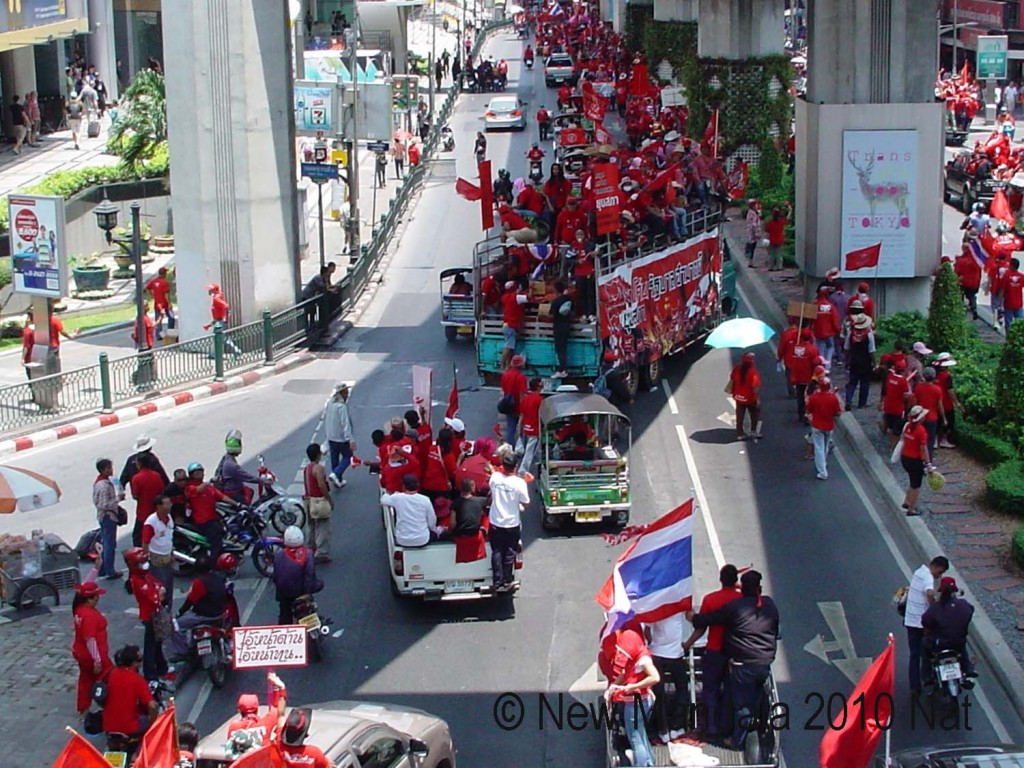The most recent demonstrations held by the Thai Red Shirts in Bangkok included many Lao nationals. Just how many is impossible to tell. But local informants from the urban village of Sikay near the Vientiane airport say that “hundreds” of people from there went to join the demonstrations. Why? The payment of 300 baht per day, plus food and amenities for demonstrators, is well above the basic wage here in Laos and many poorer people in Vientiane decided to take advantage of this.
I have no information from either Savannakhet or Champasak provinces where the flow of Lao into Thailand is substantial and people are well-informed about developments there. But there is little reason to doubt that they also took advantage of the wind-fall.
Perhaps Lao have done this on previous occasions, but the number of people who went off to Bangkok this time was cause for comment and gossip.
Probably a majority of Lao along the Mekong profess support for the Red Shirt’s cause, and probably many of the Lao who went to Bangkok were also more-or-less Red Shirt supporters. But, the fact that they went for the money, and really had no place being there, suggests rather complex motivations.
The impact of the crisis in Thailand on Laos is worth remarking on. Since 2010 in particular, many Lao have been avid watchers of the Red channel from Thailand, and are one-eyed supporters of their cause. Strangely the Red channel’s propaganda is strikingly similar to the fare the Lao get from their own stations, yet Thai stations in general remain overwhelmingly popular here.
Their motivations for supporting the Red Shirts are obviously related to what Charles Keyes, in writing about Isan, has called “ethno-regional” solidarity. But it is also a kind of bloody-minded, “anything that hurts the Thai of Bangkok” is good.
Lao Red Shirt supporters, however, rarely reflect on the fact that the demonstrations by the Red Shirts would be impossible inside Laos; except when one asks, and the reply is invariably, “no, this would be impossible here.”
One can only surmise that politics in Thailand has become a surrogate for the complete absence of politics in Laos. It is one of the strange features of a hyper-politicised Leninist state; there is in fact no politics, and no information about politics. Thus one can have a perfectly coherent conversation about Thai politics with a Lao, but turn to Lao politics and the conversion immediately stalls.
The Lao Peoples’ Revolutionary Party have used the “chaos” in Thailand well. Two years ago I assisted in a survey project by the Lao Academy of Social Sciences of Champasak, Vientiane, and Luang Phrabang, where we (among other things) were probing the influence of Thai TV on Lao viewers. In this context our informants almost invariably commented on how stable and peaceful Laos was compared with Thailand. Indeed, some even pointed to the virtues of the one-party system – probably party people themselves. The Party has stressed again and again the virtues of one-party rule for stability, and our survey showed this has been effective.
Prior to 2010 one would occasionally be engaged informally in a discussion about the virtues or not of multi-party systems. No more.
Thus it is a sad irony that the Red Shirt’s struggle for secure democratic rights in Thailand has resulted in a shut down of precisely such a discussion in Laos.
Thailand is now under military rule, but even so it has more freedom to discuss issues than in Laos. The equivalent of a Red Shirt leadership in Laos would not have been detained briefly and then released, but jailed for many years. At the end of 2012 the Lao authorities kidnapped one of the countries most prominent NGO leaders, Sombath Somphone, without a murmur in Laos, and without any sense that they should be accountable. Since then the NGO sector has been frozen with fear.
The Lao support of the Red Shirts is largely emotional and does not lead to any reflexive thought. In a society of hyper-politicization one becomes apolitical, and that includes foreigners too.
Grant Evans is a senior research fellow in anthropology at the ├Йcole Fran├зaise d’Extr├кme-Orient, Vientiane, Laos.
 Facebook
Facebook  Twitter
Twitter  Soundcloud
Soundcloud  Youtube
Youtube  Rss
Rss 
